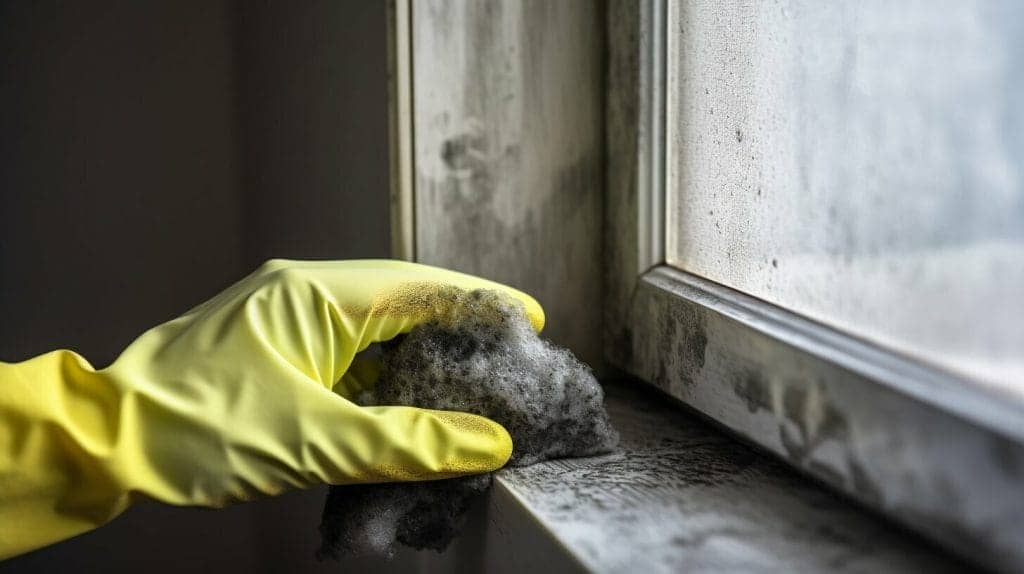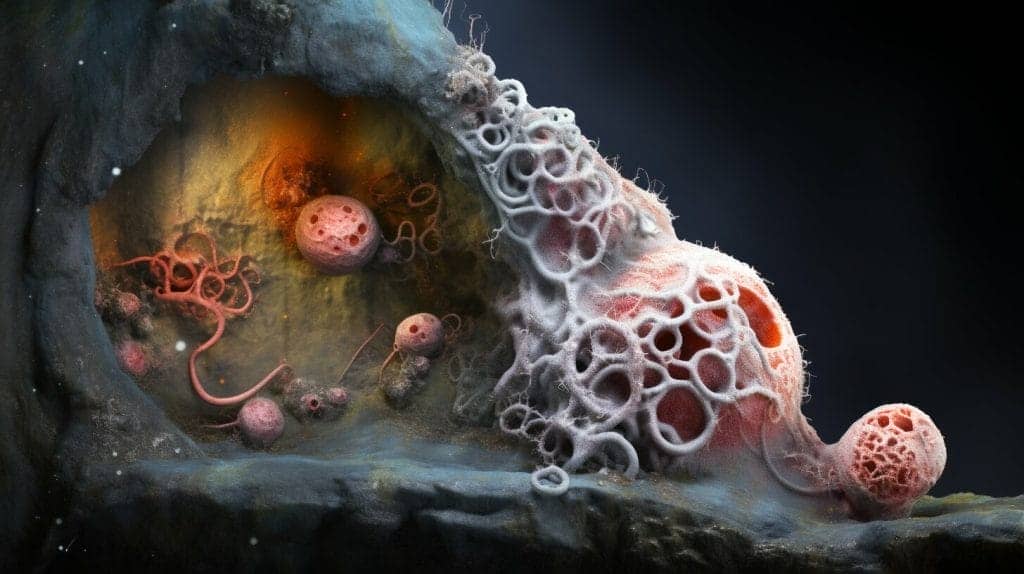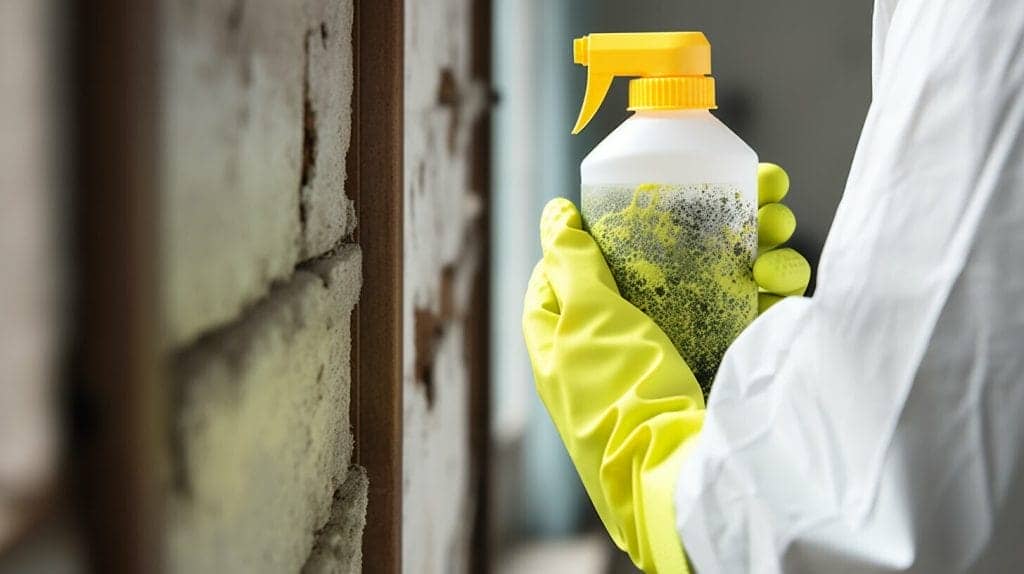Recent clinical research has shed light on the link between mold exposure and memory issues. Mold toxicity can lead to cognitive impairment, memory loss, and other neurocognitive dysfunction. While symptoms may vary depending on the individual, mold-induced memory problems are a serious concern that should not be ignored.
Key Takeaways:
- Clinical research has linked mold exposure to memory issues and cognitive dysfunction.
- Mold-induced memory problems can have serious implications for an individual’s overall cognitive health.
- It is important to take proactive steps to mitigate mold exposure to prevent further memory issues.
Understanding Mold-Induced Memory Issues
Exposure to mold can have negative effects on cognitive function, including memory. Clinical research has shown that memory problems caused by mold exposure can be attributed to specific neurocognitive dysfunction associated with mold toxicity.
Mold-related memory loss can manifest in various ways, such as difficulty with concentration and focus, forgetfulness, and confusion. These memory issues can impact daily life and require attention and treatment.
The link between mold exposure and memory problems is backed by clinical research, which has identified a range of cognitive impairments associated with mold toxicity. In addition to memory loss, these impairments include issues with attention, processing speed, and executive function.
Overall, understanding the specific memory issues caused by mold exposure is crucial for effective diagnosis and treatment. By examining the research on the effects of mold exposure on memory, healthcare professionals can better identify and address mold-induced cognitive dysfunction.
The Impact of Mold Toxicity on Cognitive Function
Mold toxicity can have a profound impact on cognitive function, including memory. Research has shown that exposure to mold can lead to neuroinflammation, which is associated with a range of cognitive impairments, including memory loss and difficulty with focus and concentration.
One study found that individuals with higher levels of mold exposure were more likely to experience cognitive dysfunction, including memory problems. Specifically, mold exposure was associated with reduced memory and learning abilities, as well as slower processing speed.
| Cognitive Impairments Associated with Mold Exposure |
|---|
| Memory loss and impairment |
| Difficulty with focus and concentration |
| Reduced learning abilities |
| Slower processing speed |
In addition to neuroinflammation, mold exposure can also lead to oxidative stress, which can contribute to the development of cognitive dysfunction. The toxic byproducts produced by mold can also damage brain cells and impair neuronal function, further exacerbating memory and cognitive problems.
It’s important to note that the impact of mold toxicity on cognitive function can vary depending on the individual’s level of exposure, as well as their age, genetic makeup, and other factors. However, the evidence suggests that mold-induced memory issues are a genuine concern that should not be overlooked.
The Role of Neurocognitive Testing
Neurocognitive testing can be a valuable tool in identifying and assessing the extent of mold-induced memory issues. These tests can evaluate various aspects of cognitive function, such as memory, attention, and processing speed, providing a comprehensive picture of the individual’s cognitive abilities.
By identifying specific areas of cognitive impairment, neurocognitive testing can guide targeted treatment strategies, such as cognitive training exercises or lifestyle modifications. It can also serve as a useful baseline for tracking improvements in cognitive function over time.
Overall, the impact of mold toxicity on cognitive function is a growing area of concern, with research highlighting the need for proactive measures to reduce exposure and address any resulting memory issues.
Clinical Research on Mold-Induced Neurocognitive Dysfunction
Clinical research has shown that mold toxicity can lead to various forms of neurocognitive dysfunction, including memory impairment. A study published in the Journal of Occupational and Environmental Medicine found that exposure to mold and water damage in schools was associated with higher rates of memory impairment and other cognitive problems among students and staff.
Another clinical study from the University of Turku in Finland further supported these findings, showing that mold exposure was linked to significant deficits in cognitive function, including memory and learning. In addition to memory problems, mold-induced neurocognitive dysfunction can also manifest in other ways such as decreased attention span, difficulty with executive function, and reduced processing speed.
Researchers have identified a number of possible mechanisms by which mold can lead to cognitive dysfunction, including neuroinflammation, oxidative stress, and disruption of the blood-brain barrier. These complex processes can ultimately lead to changes in brain structure and function that impair memory and other cognitive abilities.
Holistic Approaches to Mold Toxicity Treatment at Oasis Medical Institute
Oasis Medical Institute in Tijuana, Mexico, offers a comprehensive and integrative approach to mold toxicity treatment. This approach combines conventional medical treatments with complementary therapies to address the underlying causes of mold-induced memory issues and cognitive dysfunction. The holistic treatment program at Oasis is led by Dr. Francisco Contreras MD, an expert in integrative medicine with over thirty years of experience.
The program begins with a thorough evaluation of each patient’s medical history, symptoms, lifestyle, and environmental factors to create a personalized treatment plan. Conventional medical treatments may include antifungal medications, immune system support, and detoxification protocols. Complementary therapies may include nutritional counseling, acupuncture, massage, and mind-body techniques to support emotional and mental well-being.
| Benefits of the holistic mold toxicity treatment program at Oasis: |
|---|
| Comprehensive approach: The program addresses all aspects of mold toxicity, including physical, emotional, and environmental factors, providing a complete and effective solution. |
| Personalized treatment: The program is tailored to each patient’s unique needs, ensuring that they receive the care and attention required for optimal outcomes. |
| Expert guidance: Dr. Francisco Contreras and his team of medical professionals provide expert guidance and support throughout the treatment process, ensuring that patients feel confident and empowered in their journey to recovery. |
The holistic approach of Oasis Medical Institute is informed by the latest clinical research on mold-induced memory issues and the impact of mold toxicity on cognitive function. By addressing the root causes of mold toxicity and supporting the body’s natural healing mechanisms, the treatment program can result in improved memory, cognitive function, and overall well-being.
Integrative Medicine for Mold Toxicity
At Oasis Medical Institute, the approach to treating mold-induced memory issues is integrative and comprehensive. Conventional medical treatments are combined with complementary therapies to target the underlying causes of mold toxicity, including the physiological changes that affect memory and overall cognitive function. This approach emphasizes the importance of personalized care and taking a holistic view of each patient’s health.
The comprehensive treatment program at Oasis focuses on detoxification, immune support, and restoring balance to the body. This involves a combination of IV therapies, such as high-dose vitamin C, glutathione, and ozone therapy, as well as natural supplements to support immune function and promote healing.
In addition to medical treatments, Oasis offers a range of complementary therapies to support memory and cognitive function, such as acupuncture, massage, and meditation. These therapies can help patients manage stress and improve mental clarity, ultimately supporting their overall cognitive health.
Personalized Treatment Plans
Each patient at Oasis receives a personalized treatment plan designed to address their unique health needs and goals. The treatment team works closely with patients to create a plan that may include a combination of conventional medical treatments and complementary therapies. This personalized approach ensures that patients receive the care they need to optimize their cognitive health and overall well-being.
Expertise of Dr. Francisco Contreras MD
Dr. Francisco Contreras MD, founder and chairman of Oasis Medical Institute, is an internationally recognized expert in integrative medicine and cancer treatments. He has spent over 30 years developing comprehensive treatment programs for patients suffering from chronic illnesses, including mold toxicity. His expertise and cutting-edge treatments have helped countless patients regain their health and vitality.
If you are suffering from memory issues caused by mold toxicity, the comprehensive and personalized treatment program at Oasis Medical Institute may be able to help. To learn more or book a consultation, call 866-868-1992 or visit the Oasis Medical Institute website.
The Role of Lifestyle Changes in Treating Mold-Induced Memory Issues
While it’s crucial to seek professional medical assistance for treating mold-induced memory issues, lifestyle changes can also play a significant role in supporting cognitive health. Making positive changes in factors that affect overall health and well-being can help enhance memory and cognitive function.
First and foremost, diet can play a vital role in supporting cognitive health. Avoiding processed foods and consuming plenty of whole, nutrient-rich foods such as fruits, vegetables, and whole grains can promote cognitive function. Additionally, consuming foods high in antioxidants can help combat oxidative stress, which is a common physiological change associated with mold toxicity and cognitive impairment.
Exercise is another lifestyle change that can support memory and cognitive function. Studies have shown that regular physical activity can enhance brain function and promote memory consolidation. Engaging in activities that require concentration and focus, such as yoga and meditation, can also support cognitive function and emotional well-being.
Stress management is another crucial aspect of promoting cognitive health. Chronic stress has been linked to cognitive decline and memory impairment. Engaging in stress-reducing activities such as deep breathing, massage, and acupuncture can promote relaxation and enhance cognitive function.
Finally, environmental modifications can be critical in reducing mold exposure and supporting cognitive health. Addressing mold sources in the home or workplace, ensuring proper ventilation, and minimizing exposure to other environmental toxins can all promote cognitive function.
At Oasis Medical Institute, patients undergoing treatment for mold-induced memory issues can receive guidance and support in implementing these lifestyle changes. The comprehensive treatment program at Oasis includes a focus on holistic and integrative approaches to address the underlying causes of mold-induced cognitive dysfunction.
Addressing Environmental Mold Exposure
Mold exposure and the resulting memory issues it can cause are serious health concerns. In addition to seeking professional consultation and treatment for mold toxicity, it is important to address the root cause of the problem by mitigating environmental mold exposure. Here are some tips for identifying and addressing mold sources:
| Tip | Description |
|---|---|
| Inspect your home for water damage | Mold thrives in moist environments, so it is essential to locate and fix any water leaks or damage in your home. Check for any signs of water damage, such as stains or discoloration on walls and ceilings, musty odors, or peeling paint. |
| Reduce indoor humidity levels | Use a dehumidifier to maintain indoor humidity levels below 50%, especially in areas with high moisture such as bathrooms, kitchens, and basements. Ensure proper ventilation in these areas, and consider adding exhaust fans. |
| Improve air flow | Allow air to circulate freely throughout your home by opening windows and using fans. Proper air flow can help prevent moisture buildup and reduce the risk of mold growth. |
| Clean and dry wet or damp areas promptly | If any area of your home gets wet, whether from a spill or a leak, clean and dry it promptly. Mold can grow within 24-48 hours of moisture exposure, so it is essential to act quickly. |
| Use mold-resistant products | Consider using mold-resistant paint, drywall, and insulation in your home to reduce the risk of mold growth. These products are specifically designed to resist moisture and mold. |
By taking these proactive steps, you can help prevent further mold exposure and reduce the risk of memory issues caused by mold toxicity.
Importance of Comprehensive Testing for Mold Toxicity
Accurate diagnosis of mold toxicity is crucial in effectively treating memory issues caused by mold exposure. Comprehensive testing can help identify the specific type of mold and level of exposure, guiding the treatment plan for optimal results.
There are various testing methods available for mold toxicity, including blood tests, urine tests, and environmental sampling. Blood and urine tests can detect mycotoxins, which are toxic substances produced by certain types of mold. Environmental sampling involves testing the air and surfaces in a home or workplace for the presence and concentration of mold spores.
It is important to note that not all testing methods are equally reliable, and false negatives can occur. Therefore, it is essential to seek professional consultation and guidance from an experienced healthcare provider specializing in mold toxicity treatment.
Seeking Professional Consultation for Mold Toxicity Treatment
If you are experiencing memory issues and suspect that mold exposure may be the underlying cause, seeking professional consultation is essential. At Oasis Medical Institute, Dr. Francisco Contreras MD offers a comprehensive and integrative approach to addressing mold-induced memory issues.
To book a consultation or learn more about the holistic Mold Toxicity treatment program available at Oasis, call 866-868-1992. Our team of experts will work with you to develop a personalized treatment plan that addresses the root causes of your memory issues and supports cognitive health.
Benefits of Holistic Mold Toxicity Treatment
The comprehensive and personalized approach offered by Oasis Medical Institute’s holistic treatment program for mold-induced memory issues has numerous benefits and advantages over conventional medicine alone. Patients undergoing this integrative approach often experience:
- Improved cognitive function, including memory and concentration;
- Reduced neuroinflammation and oxidative stress;
- Better overall physical health;
- Increased emotional well-being and quality of life;
- Improved sleep and energy levels;
- Reduced exposure to environmental toxins;
- Comprehensive and personalized guidance on lifestyle changes and preventative measures;
- Access to complementary therapies that alleviate symptoms and support healing;
- Expertise and support from a team of experienced and knowledgeable healthcare professionals, led by Dr. Francisco Contreras MD.
Furthermore, the holistic treatment program at Oasis Medical Institute goes beyond symptom management to address the underlying causes of mold-induced memory issues. This integrative approach combines conventional medical treatments with complementary therapies, such as nutrition, acupuncture, and psychotherapy, to support healing and promote long-term cognitive health.
In short, individuals struggling with mold-induced memory issues can benefit greatly from the holistic treatment program offered at Oasis Medical Institute, which provides comprehensive and personalized care that addresses the root causes of cognitive dysfunction and supports long-term cognitive health.
Future Directions in Clinical Research on Mold-Induced Memory Issues
The impact of mold exposure on memory and cognitive function is a growing concern among researchers and healthcare professionals. To better understand and address this issue, ongoing studies are exploring the complex mechanisms by which mold can impair memory and cognitive function.
One area of investigation is the role of inflammation in mold-induced neurocognitive dysfunction. Researchers are examining the immune response triggered by exposure to mold toxins, as well as the potential for anti-inflammatory interventions to mitigate memory issues.
Another area of interest is the impact of mold on the gut-brain axis, a complex communication network between the gastrointestinal system and the brain. Emerging research suggests that disruptions in this axis may contribute to the neurocognitive dysfunction seen in individuals with mold exposure.
Other studies are exploring the potential for neuroprotective agents, such as antioxidants and anti-inflammatory compounds, to mitigate the impact of mold toxicity on memory and cognitive function.
As research continues to shed light on the complex relationship between mold exposure and memory issues, healthcare providers will be better equipped to diagnose and treat mold-induced neurocognitive dysfunction effectively.
Conclusion
Overall, clinical research on mold-induced memory issues highlights the significant impact that mold exposure can have on cognitive function and memory. The neurocognitive dysfunction associated with mold toxicity is a complex health concern that requires a comprehensive and personalized approach to treatment.
By understanding the various memory issues caused by mold exposure and the physiological changes that occur in the brain, it is possible to address mold-induced memory loss and cognitive impairment. Holistic approaches to mold toxicity treatment, such as those offered at Oasis Medical Institute, combine conventional medicine with complementary therapies to target the underlying causes of mold-induced memory issues.
Seeking professional consultation and taking proactive steps to address environmental mold exposure can help mitigate the risk of further cognitive decline. Through comprehensive testing and accurate diagnosis, individuals can take steps towards improving their cognitive health and preventing future memory issues.
As research on mold-induced memory issues continues to evolve, it is important to remain vigilant and proactive in addressing this health concern. By taking steps to mitigate mold exposure and seeking holistic treatment options, individuals can improve their cognitive function and overall quality of life.
FAQ
Q: What does clinical research reveal about mold-induced memory issues?
A: Clinical research shows that mold exposure can have a significant impact on cognitive function, leading to memory problems and neurocognitive dysfunction.
Q: What are some of the memory issues caused by mold exposure?
A: Memory loss, difficulty with concentration and focus, and cognitive impairment are common memory issues associated with mold exposure.
Q: How does mold toxicity affect cognitive function?
A: Mold toxicity can lead to neuroinflammation, oxidative stress, and other physiological changes that negatively impact cognitive function, including memory.
Q: What does clinical research say about mold-induced neurocognitive dysfunction?
A: Clinical research studies have shown a link between mold exposure and neurocognitive dysfunction, providing insights into the complex mechanisms involved in memory impairment.
Q: What is the holistic approach to mold toxicity treatment at Oasis Medical Institute?
A: The holistic treatment approach at Oasis Medical Institute combines conventional medicine with complementary therapies to address mold toxicity and its impact on memory issues.
Q: How does integrative medicine play a role in treating mold toxicity at Oasis Medical Institute?
A: Integrative medicine at Oasis Medical Institute combines conventional medical treatments with complementary therapies to target the underlying causes of mold-induced memory issues.
Q: How important are lifestyle changes in treating mold-induced memory issues?
A: Lifestyle changes, such as adopting a healthy diet, exercise, stress management, and environmental modifications, play a crucial role in supporting memory and cognitive function.
Q: How can environmental mold exposure be addressed to prevent further memory issues?
A: Practical tips and strategies for identifying and mitigating mold sources in the home or workplace can help create a mold-free environment and protect cognitive health.
Q: Why is comprehensive testing for mold toxicity important?
A: Comprehensive testing, including blood tests, urine tests, and environmental sampling, is crucial for accurate diagnosis and effective treatment of mold-induced memory issues.
Q: How can one seek professional consultation for mold toxicity treatment?
A: To seek professional consultation for mold toxicity treatment, readers can book a consultation or call the provided number to learn more about the holistic treatment program at Oasis Medical Institute.
Q: What are the benefits of opting for holistic mold toxicity treatment?
A: Holistic mold toxicity treatment at Oasis Medical Institute offers a comprehensive and personalized approach that can potentially improve memory and cognitive function, as evidenced by success stories from patients.
Q: What are the future directions in clinical research on mold-induced memory issues?
A: Ongoing studies and emerging areas of investigation in clinical research on mold-induced memory issues aim to advance understanding and treatment methods for this health concern.
Dr. Francisco Contreras, MD is a renowned integrative medical physician with over 20 years of dedicated experience in the field of integrative medicine. As the Medical Director of the Oasis of Hope Hospital in Tijuana, Mexico, he has pioneered innovative treatments and integrative approaches that have been recognized globally for the treatment of cancer, Lyme Disease, Mold Toxicity, and chronic disease using alternative treatment modalities. Dr. Contreras holds a medical degree from the Autonomous University of Mexico in Toluca, and speciality in surgical oncology from the University of Vienna in Austria.
Under his visionary leadership, the Oasis of Hope Hospital has emerged as a leading institution, renowned for its innovative treatments and patient-centric approach for treating cancer, Lyme Disease, Mold Toxicity, Long-Haul COVID, and chronic disease. The hospital, under Dr. Contreras's guidance, has successfully treated thousands of patients, many of whom traveled from different parts of the world, seeking the unique and compassionate care the institution offers.
Dr. Contreras has contributed to numerous research papers, articles, and medical journals, solidifying his expertise in the realm of integrative medicine. His commitment to patient care and evidence-based treatments has earned him a reputation for trustworthiness and excellence. Dr. Contreras is frequently invited to speak at international conferences and has been featured on CNN, WMAR2 News, KGUN9 News, Tyent USA, and various others for his groundbreaking work. His dedication to the medical community and his patients is unwavering, making him a leading authority in the field.
Contreras has authored and co-authored several books concerning integrative therapy, cancer, Lyme Disease and heart disease prevention and chronic illness, including "The Art Science of Undermining Cancer", "The Art & Science of Undermining Cancer: Strategies to Slow, Control, Reverse", "Look Younger, Live Longer: 10 Steps to Reverse Aging and Live a Vibrant Life", "The Coming Cancer Cure Your Guide to effective alternative, conventional and integrative therapies", "Hope Medicine & Healing", "Health in the 21st Century: Will Doctors Survive?", "Healthy Heart: An alternative guide to a healthy heart", “The Hope of Living Cancer Free”, “Hope Of Living Long And Well: 10 Steps to look younger, feel better, live longer” “Fighting Cancer 20 Different Ways”, "50 Critical Cancer Answers: Your Personal Battle Plan for Beating Cancer", "To Beat . . . Or Not to Beat?", and “Dismantling Cancer.”





















